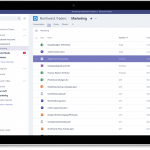Microsoft Teams will be generally available on March 14
Enterprise data privacy challenges for 2017 -- and how to defend against them

If you’re not a data security professional, you may have missed the fact that January 28th was Data Privacy Day (also known as Data Protection Day, in Europe). Since 2007, Data Privacy Day has been designated as a day to raise awareness and promote privacy and data protection best practices.
As VP CSO for Zuora, I’m all for anything that raises awareness and promotes dialogue about data security -- but obviously I don’t just focus on data privacy once a year. For me, and my security colleagues, data privacy is an everyday concern. But the fact is that these days we’re seeing data privacy becoming an everyday concern for everyone. Whether it’s potentially hacked elections or IoT devices listening in on your family conversations, questions about data privacy -- and the implications of hacked data -- are becoming more pervasive and more concerning.
How IoT will impact the data center industry in 2017

The IoT (Internet of Things), is a network of devices connected to the Internet that gathers and transmits data. The ubiquitous adoption of smartphones, and the ability to connect to anyone, anywhere at any time, will have quite the impact on the data center industry in 2017. It is anticipated that more than 24 billion IoT devices will exist worldwide by 2020. These devices include everything from smartphones, to cars, to refrigerators. This increasing amount of data that is being produced by both consumers and providers will not only change our applications and devices, but also how data centers operate.
Below are three ways in which the IoT revolution will impact the data center industry in 2017:
IBM Q is the first initiative to build commercial quantum computing systems

Your business will finally get the chance to use a quantum computer to do... well, whatever a business could use a quantum computer for. IBM has just announced IBM Q -- "an industry-first initiative to build commercially available universal quantum computing systems."
Its systems and services will be delivered via the IBM Cloud platform, and IBM believes it could be used to "deliver solutions to important problems where patterns cannot be seen because the data doesn’t exist and the possibilities that you need to explore to get to the answer are too enormous to ever be processed by classical computers."
Kaspersky discovers StoneDrill wiper malware

Security researchers from Kaspersky Lab have found a very powerful malware, one which is capable of completely wiping the contents of a disk. Announcing the finding, the security company says the malware, which it dubbed StoneDrill, was found on just two machines so far, one in the Middle East, and one in Europe.
The researchers claim StoneDrill is both similar and "very different and more sophisticated" than another wiper malware -- Shamoon 2.0. They actually stumbled upon StoneDrill while investigating Shamoon 2.0.
Using technology to fight climate change

2016 was the warmest year on record -- around 1.2 degrees C warmer than pre-industrial levels to be exact. Whilst this doesn’t sound very much, evidence has already shown that an average rise of 1 degree C across the whole of the Earth’s surface would result in huge changes to the climatic extremes we see today.
Meanwhile, our forests and oceans aren’t faring much better. The significant decline of the planet’s rainforest has been documented throughout my lifetime and, according to a report last year by the Ellen MacArthur Foundation, by 2050 there could be more plastic by weight in our oceans than fish. Add to this the recent findings that the Earth is on track to lose two-thirds of its wildlife by 2020 and it’s easy to see that we are already in a pretty dire state.
Embracing the possibilities of artificial intelligence

We have seen a machine master the complex game of Go, previously thought to be one of the most difficult challenge of artificial processing. We have witnessed vehicles operating autonomously, including a caravan of trucks crossing Europe with only a single operator to monitor systems. We have seen a proliferation of robotic counterparts and automated means for accomplishing a variety of tasks. All of this has given rise to a flurry of people claiming that the AI revolution is already upon us.
However, while there is no doubt that there have been significant advancements in the field of AI, what we have seen is only a start on the path to what could be considered full AI.
Microsoft Azure Blueprint helps public organizations move faster to the cloud

Microsoft is looking to help public sector organizations cut on the time needed to get Microsoft Azure up and running. According to a new announcement it has made, it will now take organizations hours, instead of weeks, to get things rolling.
The company has revealed a blueprint that "reinforces its cloud security principles," and a UK official template for creating workloads in Azure and Service Bus Premium Messaging.
The major challenges retailers face in 2017

Things are changing everywhere around us, you don’t need me to tell you that. Soon, the UK will probably no longer be part of the EU, the former host of the US Apprentice already holds the most powerful position in the world and, perhaps most shockingly of all, Leicester City won the UK Premier League last year. The retail arena is no different.
Once customers were happy to look at and buy their products in physical stores. However, today the modern consumer not only wants to be able to go into a store, but they also want to be able to view products on their tablet, phone or laptop and get them delivered to their home at a time of their choosing. Oh, and they want to be able to return them if they’re not happy with the product in some way. Unsurprisingly, this creates considerable challenges for retailers and this shifting market is contributing to the huge amount of change and transformation that’s already underway in the sector. But what are the key trends in retail transformation and what does it mean for hiring?
The main reasons behind the commoditization of Europe's Global Navigation Satellite Systems

We often hear people say that GPS is ubiquitous, but it is hard to comprehend how without first understanding how GPS technology has evolved and the innovation that is driving applications to make use of GPS derived data.
The advent of multi-constellation has been and will continue to be a significant driver in the uptake of GNSS (Europe’s Galileo constellation has finally arrived, starting to offer Early Operational Capability in December 2016). However, the main reasons behind the commoditization of GNSS include several technological evolutions.
The dangers of legacy email archives
To everyone who continues to own a legacy email archive -- beware! You are sitting on a ticking time bomb.
By legacy email archives, I am referring to an email archive that was designed in the early 2000’s and is likely deployed on premises; but in some cases is a hosted email archive solution. A legacy email archive presents three major risks to your IT infrastructure and organization as a whole.
Amazon brings down lots of websites with a typo

When a large portion of the Internet went offline earlier last week, no one could have guessed that the reason for it would be a simple typo. Yet, that’s exactly what happened, as Amazon gave an explanation to the incident.
A number of big websites (and an even greater number of smaller ones) went offline for five hours -- Trello, Lonely Planet, Medium, IFTTT, Quora, and pretty much every site built on Wix.
Small businesses aren't sold on SaaS

Three quarters (75 percent) of large businesses now consider SaaS tools an essential part of their business. This is according to a new report by GoCardless, based on a poll of more than 1,000 senior decision makers.
Small businesses aren’t that convinced though, with every second company sharing the same thoughts on SaaS.
Nearly 3 million UK businesses experienced a cyber-security incident in 2017

More than half of businesses in the UK were victims of cybercrime last year, according to a new report by Beaming. The report says that 2.9 million UK firms, or 52 percent, experienced some form of cyber-security incidents, costing them £29.1 billion.
Most common incidents included virus infections and phishing attacks. Both of them have an equal share of attacks -- 23 percent. Less than a fifth (18 percent) went on hacks and data breaches.
How would a 'robot tax' work?

On February 17, Bill Gates set the news agenda around the world by declaring that a so-called "robot tax" should be introduced in order to counteract job losses caused by automation. "Right now," he told online publication Quartz, "the human worker who does, say, $50,000 worth of work in a factory has that income taxed. If a robot comes in to do the same thing, you’d think that we’d tax the robot at a similar level."
There is no doubting that Gates' vision of job displacement is not of a distant dystopian future, but today's reality: in 2015 expenditure on robotics climbed to $46 billion, globally. A hotel in Japan, Nagasaki, is staffed entirely by robots. Even heritage British cake brand Mr Kipling has enlisted the help of 46 robots to pack its cakes.
BetaNews, your source for breaking tech news, reviews, and in-depth reporting since 1998.
© 1998-2025 BetaNews, Inc. All Rights Reserved. About Us - Privacy Policy - Cookie Policy - Sitemap.

